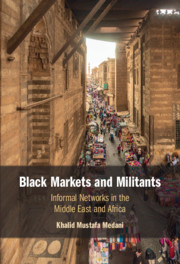Book contents
- Black Markets and Militants
- Black Markets and Militants
- Copyright page
- Dedication
- Contents
- Figures
- Tables
- Acknowledgments
- Preface
- I The Framework
- II The Institutional Context in an Era of Abundance
- III Globalization and Institutional Change in an Era of Scarcity
- 4 Economic Crisis, Informal Institutions, and the Transformation of Islamist Politics in Egypt
- 5 From Remittance Economy to Rentier State: The Rise and Fall of an Islamist Authoritarian Regime in Sudan
- 6 State Collapse, Informal Networks, and the Dilemma of State Building in Somalia
- 7 The Political Economy of Radicalization: Informal Networks and the Rise of an Urban Militant Islamism in Cairo
- Conclusion
- Book part
- Notes
- Bibliography
- Index
Conclusion
Informal Markets and the Politics of Identity
from III - Globalization and Institutional Change in an Era of Scarcity
- Black Markets and Militants
- Black Markets and Militants
- Copyright page
- Dedication
- Contents
- Figures
- Tables
- Acknowledgments
- Preface
- I The Framework
- II The Institutional Context in an Era of Abundance
- III Globalization and Institutional Change in an Era of Scarcity
- 4 Economic Crisis, Informal Institutions, and the Transformation of Islamist Politics in Egypt
- 5 From Remittance Economy to Rentier State: The Rise and Fall of an Islamist Authoritarian Regime in Sudan
- 6 State Collapse, Informal Networks, and the Dilemma of State Building in Somalia
- 7 The Political Economy of Radicalization: Informal Networks and the Rise of an Urban Militant Islamism in Cairo
- Conclusion
- Book part
- Notes
- Bibliography
- Index
Summary
Failed states, I argue in the conclusion, do not necessarily afford terrorists a conducive context for recruiting new members. This is due to four challenges that confront terrorist organizations. The first challenge is the lack of government-enforced order in failed states that is needed to provide security against local authorities. Second, is the unreliability of local allies, as in the case of Somalia, where local ties of clan and sect overlap in complicated ways. The third challenge is that the better an area is for training recruits, the more remote and sparsely populated it is, the harder it to meet basic sustenance needs. The fourth problem is the challenge of getting fiscal resources in place. Financial services in the region continue to be weak and Islamic militants have not been able to effectively use the Hawalaat to provide key financial services in weakly governed areas of the Horn of Africa.
Keywords
- Type
- Chapter
- Information
- Black Markets and MilitantsInformal Networks in the Middle East and Africa, pp. 314 - 324Publisher: Cambridge University PressPrint publication year: 2021

